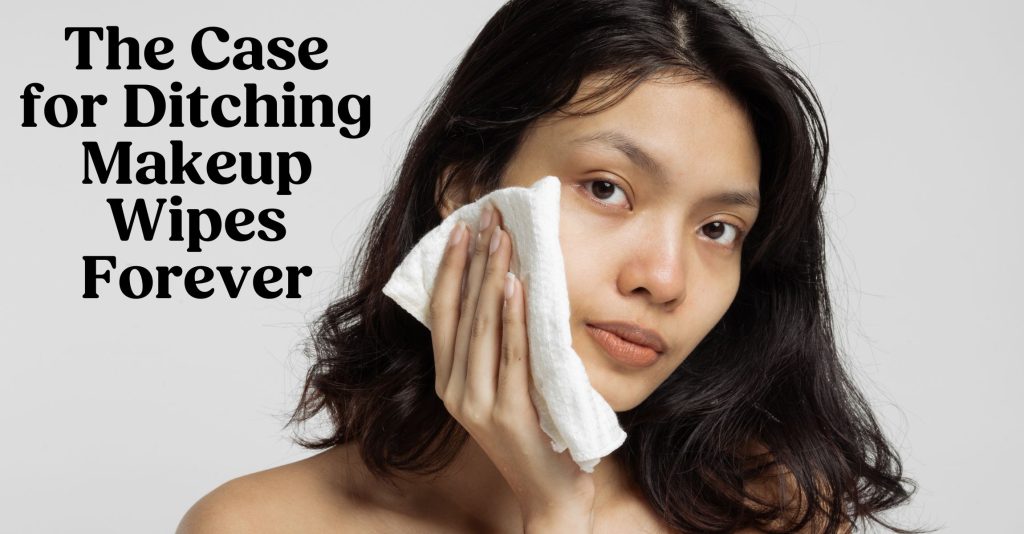
The Case for Ditching Makeup Wipes Forever
Makeup wipes are marketed as fast and easy—but the reality is they’re often rough on your skin, loaded with irritating chemicals, and terrible for the planet. Let’s take a closer look.
1. Harsh Ingredients & Skin Irritation
- Many makeup wipes carry alcohols, synthetic preservatives, and fragrances, which can strip natural oils, trigger inflammation, and disrupt your skin barrier (Clinikally, EarthHero).
- A study found that common wipes contain several allergens—including phenoxyethanol (54%), fragrance (64%), propylene glycol (25%) and lower levels of parabens—all known to cause redness and irritation (PubMed).
- Preservatives like methylisothiazolinone are linked to allergic contact dermatitis and have been restricted in leave-on wipes by EU authorities (Wikipedia). You all know I was trained as a formulator in Europe, so if it’s been banned there, we should ban it here in my opinion!
🌿 2. What’s Hiding in Top-Selling Wipes
Without naming names, many leading wipes share these red-flag ingredients:
- Synthetic fiber base (polyester or polypropylene) → Harsh on skin, break into microplastics, and don’t biodegrade (The Good Boutique).
- Alcohol or surfactants + fragrance → Strip skin’s protective barrier, increasing dryness and vulnerability (EarthHero).
- Parabens or phenoxyethanol preservatives → Parabens may mimic estrogen; phenoxyethanol can irritate and even affect the nervous system (PubMed, SELF).
🌍 3. Environmental Impact
- Wipes are typically made with non-biodegradable plastics, breaking down into tiny microplastics that pollute waterways, harm marine life, and even affect human health via the food chain (The Good Boutique).
- Chemical preservatives can leach through landfill or wastewater, releasing toxins like formaldehyde-releasing agents into the environment (Nature).
👧👦 4. Tweens & Teens: A Time to Pause
- Adolescents already use more personal care products than adults—about 17 daily compared to 12 in adult women (EWG).
- Lab tests detected endocrine-disrupting phthalates, parabens, triclosan, and musks in teen girls’ urine and blood—chemicals tied to potential hormone imbalance and reproductive issues.
- A 3-day switch to products free of such chemicals reduced teens’ body levels of parabens by 44%, triclosan by 35%, and phthalates by 27% (Organic Authority).
- During puberty, bodies are more vulnerable—wiping away sebum and protective oils while applying hormone-disrupting chemicals can compound irritations and hormonal shifts.
✅ 5. Gentle, Clean Alternatives
Swap out toxic convenience for results-driven kindness:
Use these instead of wipes:
- Plant-powered cleansing oil — loosens makeup and sunscreen gently
- pH-balanced foam cleanser — removes leftover residue without disrupting skin
- Soft reusable muslin/konjac cloths — zero waste, effective, and gentle
- Silicone cleansing brush — light exfoliation without barrier damage
At Simple Body, we recommend our:
- Cleansing Oil — dissolves waterproof makeup and excess oil
- Chamomile or Rose Foaming Face Wash — lifts impurities without messing with your skin’s natural pH
- Silicone Facial Brush — for a deep-but-gentle clean
✨ Final Word
Makeup wipes may feel harmless, but they’re a hidden culprit behind irritated skin, disrupted hormones—especially in young people—and environmental harm. If you or your tween/teen are still using wipes, consider it a small switch for a big payoff: calmer, cleaner skin and a healthier planet.
Once you try a gentler routine with oil+cleanser and reusable cloths, you may never go back. And that’s a win—for everyone.
xoxo
Jewels
